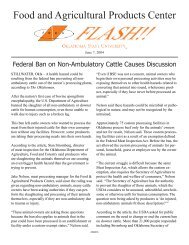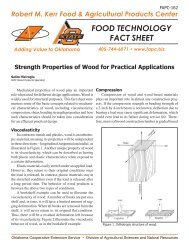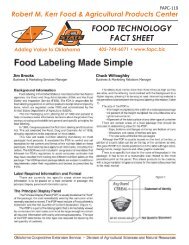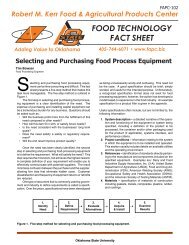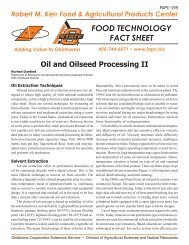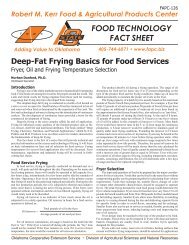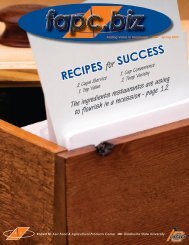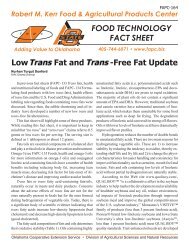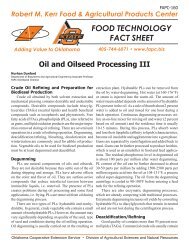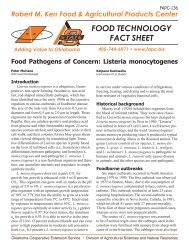2008 Annual Report - Robert M. Kerr Food & Agricultural Products ...
2008 Annual Report - Robert M. Kerr Food & Agricultural Products ...
2008 Annual Report - Robert M. Kerr Food & Agricultural Products ...
Create successful ePaper yourself
Turn your PDF publications into a flip-book with our unique Google optimized e-Paper software.
Effect of canola oil quality on biodiesel<br />
conversion efficiency and properties<br />
Objective<br />
Many small biodiesel producers<br />
use feedstock oils, which vary in<br />
quality and degree of refining and<br />
range from crude to highly refined, in<br />
their operations. There are claims that<br />
mechanically extracted oil makes better<br />
biodiesel as compared to that from<br />
hexane-extracted oil. However, there<br />
was no comprehensive study evaluating<br />
the effect of oilseed extraction<br />
and refining techniques on biodiesel<br />
production efficiency and properties,<br />
specifically products derived from<br />
canola.<br />
Therefore, the main objective of<br />
this study was to examine conversion<br />
efficiency and quality of biodiesel<br />
produced from canola oil obtained by<br />
both hexane and mechanical extraction<br />
methods.<br />
Approach<br />
Hexane extracted crude, degummed,refined-bleached-deodorized,<br />
and mechanically extracted<br />
canola oils were converted to biodiesel<br />
using the traditional transesterification<br />
method. Sodium methoxide in methanol<br />
was used as a catalyst. Material<br />
balances for conversion of hexane<br />
and mechanically extracted oils to<br />
biodiesel were calculated. Viscosity,<br />
flash point, storage stability, cloud<br />
point, moisture, free and total glycerol<br />
content, differential scanning calorimeter<br />
cooling curves and energy content<br />
of biodiesel samples were determined.<br />
The results from the quality tests were<br />
compared with European (EN-14214)<br />
and ASTM (D6751-08) standards.<br />
Hexane extracted crude oil had the<br />
lowest biodiesel conversion efficiency<br />
among the samples examined in the<br />
study. The degree of oil refining had a<br />
significant effect on biodiesel quality.<br />
Benefits<br />
Data generated from this study<br />
will be helpful for small, on-farm<br />
biodiesel producers when making<br />
decisions on the level of oil refining<br />
required to achieve good conversion<br />
and biodiesel quality.<br />
Economic Impact<br />
The findings of this study will help<br />
farmers and small processors improve<br />
the economic feasibility of biodiesel<br />
production operations and improve<br />
final product quality. These improvements<br />
will lead to economic savings<br />
and cleaner biodiesel for farm vehicle<br />
use.<br />
Continuing Work<br />
Currently, there are<br />
biodiesel characterization and<br />
quality tests and data analysis<br />
underway.<br />
Publications<br />
Two abstracts regarding<br />
this research were prepared<br />
for oral presentations at the<br />
American Oil Chemists<br />
Society <strong>Annual</strong> Meeting and<br />
Expo in Orlando, Florida, and<br />
American Society of <strong>Agricultural</strong><br />
and Biological Engineers<br />
<strong>Annual</strong> International Meeting<br />
in Reno, Nevada.<br />
Funding<br />
The Division of <strong>Agricultural</strong><br />
Sciences and Natural<br />
Resources Team Initiative<br />
Project provided funding for<br />
this project.<br />
Collaborators<br />
Dr. Nurhan Dunford, FAPC<br />
oil/oilseed chemist, was the<br />
principal investigator for this<br />
project. Aihua Su, FAPC oil/<br />
oilseed chemistry research specialist,<br />
also was a collaborator.<br />
<strong>2008</strong> <strong>Annual</strong> <strong>Report</strong> –– 37



